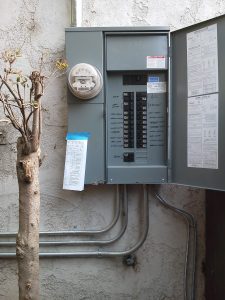
First, let’s discuss the electrical panel. The electrical panel, also known as the breaker box, is a metal box that houses your circuit breakers and other electrical components. It is typically located in a utility room or garage and can be identified by a gray or tan metal door.
The electrical panel is the central hub for your electrical system, receiving electricity from the utility company and distributing it to your home or business through the circuit breakers. If you experience an electrical issue, such as a power outage or circuit overload, the first place to check is your electrical panel.
The electrical panel typically contains a main breaker, which is the largest circuit breaker in the panel and is responsible for shutting off power to the entire electrical system in case of an emergency. The panel may also contain other circuit breakers, which are responsible for shutting off power to specific areas of your home or business in case of an overload or short circuit.
Now, let’s talk about circuit breakers. Circuit breakers are safety devices that protect your electrical system from overloads and short circuits. They are designed to detect excessive current flow and automatically shut off the circuit to prevent damage to your electrical system or electrical fires.
Circuit breakers come in different sizes and amperage ratings, and it’s essential to have the correct size and amperage rating for each circuit in your electrical panel. If a circuit breaker is too small for the electrical load it’s protecting, it will trip frequently and cause inconvenience and potentially dangerous electrical issues.
On the other hand, if a circuit breaker is too large for the electrical load it’s protecting, it may not trip when it should, leading to potential damage to your electrical system or electrical fires.
Regular electrical maintenance by a professional electrical contractor is essential to ensure that your electrical panel and circuit breakers are functioning correctly and safely. An electrical contractor can perform a comprehensive inspection of your electrical system, including your electrical panel and circuit breakers, and make any necessary repairs or replacements to keep your system running smoothly and safely.
It’s also essential to be aware of the signs of a faulty electrical panel or circuit breaker. Signs of a faulty electrical panel may include flickering lights, hot or buzzing electrical outlets, or a burning smell. Signs of a faulty circuit breaker may include frequently tripping breakers, a breaker that won’t reset, or a breaker that feels hot to the touch.
If you experience any of these issues or suspect a problem with your electrical panel or circuit breakers, it’s crucial to contact a professional electrical contractor immediately to diagnose and repair the issue.
In conclusion, understanding your electrical panel and circuit breakers is essential to maintaining the safety and functionality of your electrical system. It’s essential to have the correct size and amperage rating for each circuit in your electrical panel, and regular electrical maintenance by a professional electrical contractor is essential to ensure that your electrical system is functioning correctly and safely.
If you’re in the Deerfield Beach area, Elcon Electric is an experienced and reputable electrical contractor that can help with any electrical issues you may be experiencing. Don’t hesitate to contact us for all of your electrical needs.

